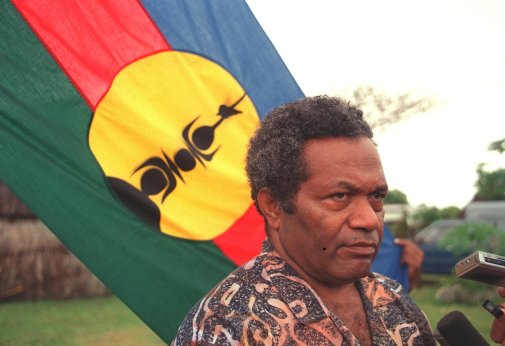
MELBOURNE (Radio Australia/Pacific Media Watch): In New Caledonia, a new film that tells the story of the Kanak revolt of the 1980s is opening up some old wounds.
The film called Order and Morality is not due to be released until September, but is already generating debate.
The debate is being fuelled by revelations from an ex high-ranking police officer, Phillipe Legorjus that Kanaks were executed in Ouvea by French security personnel - but that no one was charged as an amnesty was signed as part of the Matignon Accords in 1988.
Presenter: Janak Rogers
Speaker: David Chappell, associate professor of Pacific Islands history, University of Hawai'i
CHAPPELL: Families of the French police and soldiers are still upset that some of those guys got killed, and then the Kanaks, on their side, especially the descendants of the Dianou family. He was the leader of the Kanak group incident on Ouvea. They were unhappy that they wanted to make the film right on Ouvea, which was a sort of logical choice because it has been over 20 years.
But it was still too sensitive an issue to have a film made on that side of tragedy, because you not only had people getting killed on both sides in 1988, but then you also had Jean-Marie Tjibaou and Yeweine Yeweine of the Kanak nationalist movement being assassinated there in the same place in 1989.
And so there are all of these - you might say ghosts - hovering around the issue. The Ouvea incident was in a sense the climax of the Kanak revolt of the 1980s, and it led directly to the first negotiated peace agreement in the country's history.
It has been a French colony since 1853, but only in 1988 after this Ouvea tragedy did they actually sit down and successfully negotiate a peace agreement, and that was followed by another agreement in 1998.
So it opened a whole new era of how to handle things in New Caledonia. Instead of just France dictating new policies depending on which political parties in power in Paris, you now have a structure setup so that the representatives of the indigenous people and the immigrant groups and from Paris sit down regularly and negotiate and discuss and try to come up with solutions.
So it's more than just an unhappy memory, Ouvea was a turning point in the history of the country. Legorjus was the guy stuck in the situation on the ground, he'd actually almost worked out something with Dianou to get the hostages released and have a fair trial for people, and then the order came down from the top from Paris for the assault with helicopter gunship and all of this kind of thing.
And so he too seems to feel that there's a lack of closure, a lack of resolution because of the way it all happened, including having the amnesty right way.
ROGERS: He has written a book as well which has been turned into a film now by Matthew Kassovitz, which will be released in September. Even though we haven't seen the film, the book has been out and it's definitely stirred a lot of public debate at the moment. To what degree is Ouvea a turning point, and how are those ghosts sort of still playing out in New Caledonian society at the moment?
CHAPPELL: Both sides of the sort of ethnic divide in New Caledonia have reacted to the film and on the one side you have the families of the police and soldiers and these sorts of people who are still unhappy that they lost their loved ones in this incident and want some of the Kanaks prosecuted more.
Whereas on the other side, the Kanaks are saying that the revelation shows that the French covered up executions of captives, and in the case of Dianou, who is the leader, they neglected his wounds and he basically bled to death instead of being cared for after everybody had surrendered.
And so they see it as yet another proof that they were right to be so critical of the French and of the French settlers, and this sort of thing.
So you have a younger generation that didn't experience any of it, and they're expressing various feelings, sometimes of wanting to see the film and sometimes arguing, well it's a work of fiction, it shouldn't be regarded as history but it'll give us something to think about.
Some people who are more recent arrivals in the country say that they haven't seen the film but they're already worried it's going to be too biased in favour of the Kanaks, and other people are saying the opposite.
Legorjus seems to have seen the film and thinks it's very good and balanced at this point because the director Kassovitz, who is also involved in the script, made some adjustments after talking to Legorjus and a couple of other people about the script.



